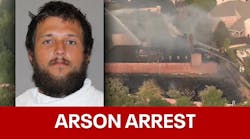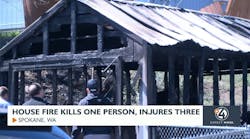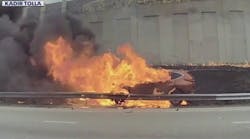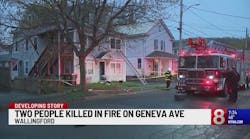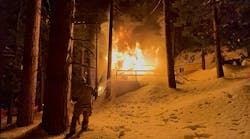I have attended more than a couple of fire service classes over the past few years, and I also have a stack of firefighting trade periodicals sitting on my desk that I read frequently. In each, I see the same theme being emphasized over and over again — firefighter safety.
This I applaud, because our job is inherently dangerous and we must constantly train and be reminded how to stay safe. Yet with all of this training and all of the reminders, we are still losing our fellow firefighters for largely preventable reasons. It only stands to reason that something is missing in our approach to solving this problem. I believe it is because we are going in the wrong direction when addressing the ongoing safety issue. My theory is this: Wouldn't the obvious and most efficient solution to any problem be the elimination of that problem in the first place?
The most frequent topics on firefighter safety include accountability, rapid intervention teams, strategy and tactics, rehab and air management — all very important topics. But aren't these skills reactive? Once the alarm sounds for a fire, aren't firefighters already at risk? Statistics show that many firefighter deaths and injuries occur while responding to and returning from fires. So if we want to solve the firefighter injury and death problem, wouldn't the most obvious and efficient solution be the elimination of, or at least reduction of, the original problem — the fire — and need to respond in the first place?
Why aren't we, as a fire service, putting as much time and effort into preventing those fires from occurring as we are devoting to reducing fireground deaths and injuries? Fires are starting and people are dying for the same predictable and preventable reasons as most of our firefighters. We are attempting to address the problem from the wrong end, and by doing so we are putting our efforts and dollars into a never-ending circle.
No one would debate that the above-mentioned fireground skills are necessary. Despite our best efforts, we will always have fires (yes, I said it) and firefighters will always have to take calculated risks. Most of this training is given at the start of a firefighter's career because it is important to start building the foundation of these life-saving skills early and firefighters must remain proficient in them throughout their career. But, again, aren't these skills reactive?
So where has fire prevention fallen in the training of our newest family members? Not only have fire prevention and education been the last chapter in most firefighter manuals, the new National Fire Protection Association (NFPA) Firefighter I curriculum has eliminated fire prevention and education altogether. Our previous recruits were getting this class at the end of their training; our new recruits will not get it until they reach Firefighter II. What about these skills? Aren't they also needed throughout a firefighter's career? Shouldn't a new firefighter be able to speak in an educated manner about smoke detectors and escape drills? Aren't we putting the cart before the raging-stampeding horse?
The National Fallen Firefighters Foundation (NFFF) put forth 16 bold Firefighter Safety Initiatives offering our profession a guiding path to make our firefighters, and our jobs, safer. This is a great accomplishment and those who spent their time and effort on those initiatives, which no doubt came at great personal sacrifice as everything progressive in our profession does, deserve that same "job well done" as the attack crew who puts a solid stop on a fire. But if you read this list of 16 safety initiatives, prevention topics are numbers 14 and 15 — at the very end.
I have been a proponent of the need to train our public to prevent and survive fires the same way we train our firefighters to respond and suppress them, because the environment both find themselves in when inside a fire is exactly the same. Our very own International Fire Service Training Association (IFSTA) instructor manual, seventh edition — the manual we use to learn how to train firefighters — states on page 144 in the Principles of Learning chapter, "Instructors encourage the development of attitudes and values in subtle and indirect ways," and the attitude instilled in the student are the same values that are demonstrated by instructors.
So if NFPA Firefighter I is the foundation upon which our newest firefighters build, and if what our instructor manual says is true, then what attitudes and values are we giving our recruits by downplaying the importance of prevention? Isn't the strongest building only as good as its foundation? What are we saying as a profession whose sole purpose is to protect lives and property from fire when we no longer require our newest members to learn anything about preventing deadly fires from starting?
Let's take this even a step further. According to the NFPA 2007 Fire Department Profile, 73% of the firefighters in the U.S. are volunteers. I am willing to bet due to time and cost restraints caused by an overworked, overstressed and underpaid pool of volunteers who have little time to donate, most will go only as far as Firefighter I. Conceivably, 73% of the firefighters protecting our citizens from fire in this country may not learn prevention as part of their training, and the other 27% will get it at a later date.
This is our national professional standard! What are we saying? This is a standard within a profession that claims to dedicate itself to protecting lives and property from fire, but in a nation that leads the industrialized world in fire deaths every year. A nation that kills more citizens in fire every year than in four years of combat in Iraq, and for common and predictable — and thus preventable — reasons. These are the same fires that cause our firefighters to be killed or injured while responding to them and fighting them. What message are we portraying as a profession? What are we saying about the basics of our job? Would any other successful organization operate this way? Most successful organizations instill in their new employees the values of the organizations from the very start, along with what is expected of each employee to succeed and to make the organizations successful.
Imagine that during their initial training, every one of our new, impressionable firefighters received a strong prevention foundation. What would the result be if we taught and wrote about prevention with the same frequency, and with the same intensity, as we do about fireground survival skills? How many civilian contacts do our firefighters make across the nation every day while performing their duties? Multiply that by the number of people they know in their personal lives. It is like the pebble-in-the-pond analogy; the ripples spread out until they come ashore.
The U.S. Fire Administration (USFA), whose foundation rests in the America Burning report, offers free fire prevention materials to any fire department in the United States. From coloring books to videos, this material is there for the asking and costs nothing, yet the USFA may be forced to scale back or even discontinue this program because of the lack of requests from fire departments for these prevention materials.
Will we prevent all fires? Will we prevent all fire deaths? The answer obviously is no. Will we prevent all firefighter deaths? That answer is probably no as well, but we continue to try because even if we can save a single life of one of our own, then it is worth all the effort. Just like those families who visit the station, such differences can be for our own firefighters by simply reminding them to buckle up, mask up, not to freelance and to eat healthy. This is done by officers who are educated on the causes of firefighter deaths. Why do we not have the same attitude toward our citizens? Aren't they the ones we are supposed to be protecting?
NFPA Firefighter I is a consensus standard and it is not formed by just one person, but by a group of fire service professionals. In 2012, NFPA 1001 is up for revision. I challenge you all to let your voices be heard and not only get prevention back into NFPA Firefighter I, but in the front of the manuals as well. By doing this, we as a profession of people dedicated to protecting life and property from fire can let it be known that we not only preach prevention first, but we practice it as well; and by doing so, instill in our newest members that their first job is to prevent fires before suppressing them.
I also challenge you to go to the USFA website (www.usfa.dhs.gov) and take advantage of all of the free fire prevention and firefighter safety materials available to you, and then get it out into the community and into the hands of your personnel where it will do some good. We need to take advantage of it before we lose it, and by losing it, we would also be sending a message to our government that prevention is not important to the fire service and it is OK to cut there first
On Jan. 7, 2009, due to the shocking nationwide rise in fires and fire deaths, the National Association of Fire Marshals joined the USFA in declaring a national fire emergency; In addition, just months into this year, over 35 firefighters have died in the line of duty. All of those who died in fires, or while responding to or returning from fires, died for the same reasons that firefighters have been dying for years.
It is said that those who do not learn from history are doomed to repeat it. If the student failed to learn, is it not because the instructor failed to teach? The attitude of the student is reflected by the attitude of the instructor, in subtle and indirect ways indeed!
DANIEL BYRNE is a lieutenant and the fire marshal for the Beaufort, SC, Fire Department. He holds an associate's degree in fire science and is pursuing a bachelor's degree, also in fire science. A 22-year veteran of the emergency services, Byrne is a National Fire Academy alumnus and a volunteer paramedic with Beaufort County EMS. A U.S. Marine veteran of the Desert Shield/Storm War, he is a technical sergeant with the Georgia Air National Guard, serving in the Fire Protection Division airport crash crew. He can be reached at [email protected].
